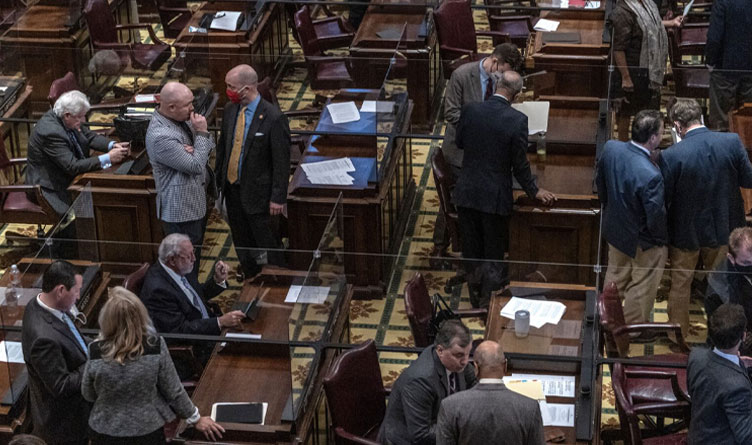Photo: Members of the Tennessee House of Representatives mill about in House Chambers. Photo Credit: John Partipilo
By Sam Stockard [The Tennessee Lookout CC BY-NC-ND 4.0] –
Reforming education funding is set to take center stage when state lawmakers convene Tuesday, Jan. 11 for the second year of the 112th General Assembly.
But as usual disagreement abounds on the motive for changing the state’s funding formula, known as the Basic Education Program, or whether the Legislature can take on the subject in only a few months, especially since it took years to come up with the guidelines. Few details are available, either, about the reform effort.
Gov. Bill Lee, who sent the Department of Education on a statewide listening tour in October 2021, wants to push forward with a bill this session in an effort to tie funding to each student rather than to school district needs. He already has said, “Now’s the time to do it” and noted the state doesn’t need to spend years developing a formula when it can tailor its formula based on others across the nation that have changed their models.
Student enrollment is the main component of the BEP formula, which has four categories and 46 specific areas, including student-teacher ratios and textbook funds. The number of administrators could be one point of contention in this debate.
Supporters of so-called reform argue that the state spends too much on K-12 administration, instead of directing the money into classrooms.
State Rep. Mark White, chairman of the House Education Administration Committee, agrees with the governor’s plan to move forward, even though some lawmakers assert that the Legislature shouldn’t take on such a massive task on a “complex” formula in an election year.
White, though, believes the state is in a strong position to take up the task because of its financial standing. Tennessee has a solid rainy day fund, with some $1.5 billion, and for the first four months of the fiscal year, state revenues are $1.189 billion more than projected.
“People keep asking me, it’s such a heavy lift, should we do it this session? My question is: If not now, will we ever get to it?” the East Memphis Republican says.
White notes he wants to make sure each system receives more state funds than they are under the current structure. He adds that the legislation shouldn’t touch local funding for education. Many counties add local tax dollars to their education funding because the state doesn’t adequately fund their needs, especially rapidly-growing school districts with aggressive building programs.
“I’m optimistic that maybe we can come up with something that will be workable, where we can put more money into education. But I’m a strong believer that money doesn’t fix education … . Money only works if you spend it correctly,” White says.
House Speaker Cameron Sexton was quoted recently as saying the current funding formula offers no incentive for school districts to excel. Typically, accountability is handled through student testing and teacher evaluations, which have been short-circuited in recent years because of the COVID-19 pandemic and technological glitches.
Accountability should be part of the equation, White says, but without punishing the districts. For example, the formula should enable the state to determine why districts receiving funds for English language learners aren’t making progress. He wasn’t certain how that accountability would be applied.
More funding vital
With Tennessee ranking 41st nationally for K-12 education funding, many Democrats say the state should put another $2 billion into the program, regardless of whether the funding formula is changed.
Republicans such as White and state Rep. Charlie Baum, a Murfreesboro Republican, agree that funding will need to be increased.
On one hand, the state can afford to spend more money on K-12 education because it has been managing its budget conservatively, Baum says. But whether the Legislature can come up with a formula and pass the legislation in a matter of months is another question, especially since formulating the current guidelines took years, he adds.
Lawmakers came up with the BEP in response to a 1990s small schools lawsuit that forced the state to find a new method for funding K-12 education. Since then, though, Metro Nashville and Shelby County school districts sued the state, and then were joined by other systems, seeking more money to deal with the difficulties of urban students, including low-income and disabled students as well as English language learners.
***CLICK HERE to support Conservative Journalism in Tennessee. We bring you stories like this without your support!***
The court is supposed to hear arguments in January. But Gov. Lee said recently his quest for reform has nothing to do with the legal battle.
“It would be more difficult to switch from the BEP funding formula to a new formula during bad economic times because we might not have the financial resources to fully fund it,” Baum says. “But I don’t think that’s the case right now.”
The state has enough “flexibility” to “at least attempt” to seriously consider a new funding formula, he says.
To gain “broad” political support to pass a new formula, the Legislature will have to add enough funding to ensure school districts are “held harmless” financially and don’t suffer “severe cuts” caused by a new formula, Baum says.
“If we provide the same amount of money for education but we divvy it up differently based on a new formula, then there’s gonna be winners and losers, and the losers are going to be opposed to the new formula, making it hard for the new formula to pass the General Assembly,” Baum says.
Baum serves on one of 18 subcommittees appointed to weigh in on a new formula. His panel deals with high-growth districts, and he’s uncertain whether reports from all of those groups can be synthesized to come up with reform this year.
Fast-growing districts face different types of pressure than urban and rural districts, which could have larger percentages of low-income students and English language learners. Rutherford County Schools, for instance, is building a school each year at a cost of $50 million to $75 million, and the BEP doesn’t kick in money to finance construction, he points out.
White concedes it will be a “challenge” to bring the matter to a vote this session. But while he believes funding is likely to be based on several factors, including the number of students in poverty and non-English households or rural and urban districts, other lawmakers want more information because they’ve been told money will be connected to each student’s needs.
State Rep. Vincent Dixie of Nashville, chairman of the House Democratic Caucus, believes reform is “long overdue” but is leery of rushing into change.
Even though he serves on the House Education Instruction Committee, he hasn’t been included in the discussion or study.
How they are attaching a dollar amount to the student, it seems like it’s a precursor for setting up for vouchers. – Rep. Vincent Dixie, D-Nashville
“Instead of accountability, I think we need to use the word transparency,” Dixie says, noting he believes different explanations are being given out to assuage different groups.
In fact, Democrats are convinced the funding formula reform is a backdoor approach to bolstering vouchers if the Tennessee Supreme Court overturns two previous court decisions that found Lee’s education savings account program to be unconstitutional. The program, which is blocked by court rulings, would provide state dollars to low-income students in Metro Nashville and Shelby County school districts to enroll in private schools.
“How they are attaching a dollar amount to the student, it seems like it’s a precursor to setting up for vouchers,” Dixie says. “That way you can truly attach a dollar amount for a student, and then you can take it, and they can say,’ I want to take my $7,800 or $9,221 to Pope John Paul,’ … and I think that’s crazy.”
Rep. Yusef Hakeem, D-Chattanooga, takes a jaded approach to the BEP change, as well.
Hakeem says the process should have started earlier than October 2021 to prepare a “thoughtful proposal” for the Legislature to consider. He also raises concerns about the small number of Democrats serving on the 18 subcommittees, saying the public looks at the reform effort with a “jaundiced eye” if politics appears to be the motive instead of education.
The potential for vouchers also “raises its head again,” Hakeem says, along with the way the state treats charter schools, which are run by non-profit organizations but receive state and local education money.
“It makes me notice very much as to whether the entire effort is about limiting public education in some way and channeling funding to things like vouchers, and I’m very concerned,” Hakeem says.

Sam Stockard is a veteran Tennessee reporter and editor, having written for the Daily News Journal in Murfreesboro, where he served as lead editor when the paper won an award for being the state’s best Sunday newspaper two years in a row. He has led the Capitol Hill bureau for The Daily Memphian. His awards include Best Single Editorial from the Tennessee Press Association. You can contact Stockard at sstockard@tennesseelookout.com.





2 Responses
Gotta love a Democrat, their so predictable. If you don’t have a logical solution, throw more money at it. First, cut administrative costs by 30%, Second, base monies on the student, Third fire every “Wokie” involved in the field of education and lastly, open all curriculum for parents inspection and provide a means to force unwanted teaching such as CRT out of the school.
Something needs to be done. Education is nothing but a money pit. The more money the more ignorant the students get. What about doing away with Tenure and get rid of do nothing teachers. They are no better than anyone else who do not do their job? That includes school discipline.